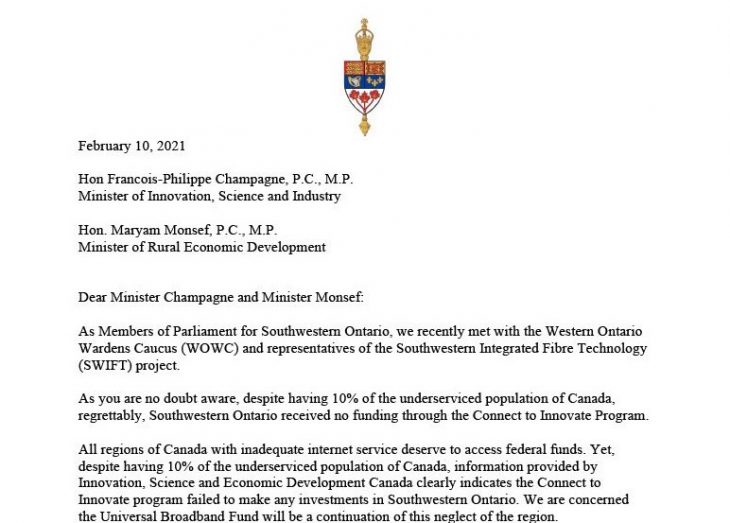
SEVERAL MEMBERS OF PARLIAMENT for Southwestern Ontario are getting behind Southwestern Integrated Fibre Technology (SWIFT) and its 2.0 GigaProject, calling on the federal government to provide funding for the project which aims to bring 1 Gbps broadband services to 95% of the population in the region by 2026.
In a letter dated February 10, the 14 MPs who signed the letter ask Francois-Philippe Champagne, minister of innovation, science and industry, and Maryam Monsef, minister of rural economic development, to ensure the SWIFT 2.0 GigaProject receives federal funding. The MPs point out the Southwestern Ontario region did not receive funding for broadband projects through the Connect to Innovate program.
SWIFT itself was funded under the 2014 New Building Canada Fund – Small Communities Fund (NBCF-SCF), a joint federal and provincial infrastructure funding program, as well as municipal funding.
“All regions of Canada with inadequate internet service deserve to access federal funds. Yet, despite having 10% of the underserviced population of Canada, information provided by Innovation, Science and Economic Development Canada clearly indicates the Connect to Innovate program failed to make any investments in Southwestern Ontario. We are concerned the Universal Broadband Fund will be a continuation of this neglect of the region,” reads the MPs’ letter, referencing the recently announced $1.75 billion federal broadband fund.
According to the letter, SWIFT has requested an investment of $313 million for its 2.0 GigaProject, which would be the funding organization’s next phase. “The SWIFT 2.0 GigaProject aims to deliver 1 Gbps services to 95% of the population within the SWIFT Region by 2026. Currently, 86.4% of the population in the region have access to levels of service greater than 100 Mbps. At the conclusion of the SWIFT 1.0 project in 2023, 89.7% of the population will enjoy these speeds. The SWIFT 2.0 GigaProject will ensure that another 191,000 people, that are currently underserved, will enjoy fast, reliable, and affordable high-speed broadband connectivity,” reads the 2.0 GigaProject document presented recently to Grey County council.
“In addition, we would strongly encourage the Government of Canada to improve coordination and consider either the direct funding of regional projects such as SWIFT or flow broadband funding through the provinces which are already administering their own broadband programs,” says the letter.
“We urge you to ensure Southwestern Ontario receives a fair proportion of funds for rural internet improvement. We are calling on your Government to provide direct assistance to SWIFT and end the bureaucratic process that omits rural communities in our region,” concludes the letter.
The MPs, all Conservatives, who signed the letter are John Nater (Perth–Wellington), Diane Finley (Haldimand–Norfolk), Dean Allison (Niagara West), Dave MacKenzie (Oxford), Phil McColeman (Brantford–Brant), Ben Lobb (Huron–Bruce), John Brassard (Barrie–Innisfil, whose Twitter account made the letter public), Marilyn Gladu (Sarnia–Lambton), Scot Davidson (York–Simcoe), Kyle Seeback (Dufferin–Caledon), Dave Epp (Chatham-Kent–Leamington), Lianne Rood (Lambton–Kent–Middlesex), Alex Ruff (Bruce–Grey–Owen Sound) and Doug Shipley (Barrie–Springwater–Oro-Medonte).
We asked Ministers Monsef and Champagne for comment but did not receive one by the time this story was originally posted, but a spokesperson responded with the following:
“Rural communities are the backbone of our economy. When rural Canada succeeds, all of Canada is made stronger. That’s why connecting every Canadian household, every business and every community, including in rural and remote communities, is a key part of our pandemic response. It is where Canada’s economic recovery begins, and we are committed to getting it done.
SWIFT is an eligible applicant under the Universal Broadband Fund (UBF) as outlined in the Application Guide. The UBF is an application-based program and therefore requires that a project application be put forward in order for funding to be awarded. Each application is evaluated in a competitive process against UBF program criteria and decisions will be made on each. Individual applications from SWIFT, telecom service providers, municipalities or other eligible entities in the SWIFT coverage area may be submitted if they meet the eligibility requirements of the program.
Regarding other potential sources of funding for SWIFT, our government has made billions of dollars available, through several other programs, to support the building of rural and remote Internet infrastructure that SWIFT could potentially consider. In particular:
- The $2 billion Rural and Northern Communities stream of the Investing in Canada Infrastructure Program allocates funding to the provinces and territories, and it supports broadband infrastructure, as well as food security, transportation, energy and other projects of value to Canada’s rural and remote communities. For further information please contact Infrastructure Canada.
- The Canada Infrastructure Bank’s $2 billion broadband initiative will accelerate connectivity in underserved communities through innovative loans and equity to support broadband infrastructure. For more information please contact the CIB directly.
- The Canadian Radio-television and Telecommunications Commission’s (CRTC) $750 million Broadband Fund will also help to improve connectivity across the country.
- The Federal Gas Tax Fund offers annual funding to support local governments in a number of priorities, including broadband and connectivity.
Through the UBF, our government is committed to connecting 98% of Canadians to high-speed Internet by 2026 and 100% by 2030. The UBF also has a Rapid Response Stream for projects that must be completed by November 15, 2021, and notification of successful applicants is already underway. Some of the UBF Rapid Response Stream projects that have already been announced include over $2.1 million for Mornington Communications and the Niagara Regional Broadband Network to provide high-speed Internet to 310 households in rural Southwestern Ontario. For the latest announcements, please visit our selected projects page.
While our government is playing a leadership role by providing broadband funding, it is imperative that all orders of government across Canada, as well as the private sector, Internet service providers and other stakeholders, lend support and resources to closing the broadband gap and achieving the targets set out in Canada’s Connectivity Strategy.”



